List of Prime Ministers of Canada
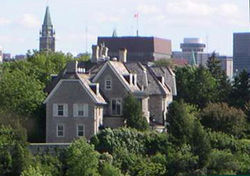
The Prime Minister of Canada is the primary Minister of the Crown, chairman of the Cabinet, and thus Head of Government of Canada. The office is not outlined in any of the documents that constitute the written portion of the Constitution of Canada; executive authority is formally vested in the Canadian sovereign and exercised on his or her behalf by the Governor General. The prime ministership is part of Canada's constitutional convention tradition. The office was initially modelled after the job as it existed in Britain at time of Confederation in 1867. The British prime ministership, although fully developed by 1867, was not formally integrated into the British constitution until 1905—hence, its absence from Constitution Act, 1867. The Prime Minister is almost invariably the leader of the political party that holds the largest number of seats in the House of Commons.
Stephen Harper is the current Prime Minister, appointed by Governor General Michaëlle Jean as the 22nd Prime Minister of Canada on February 6, 2006. He is the leader of the Conservative Party, which won 143 of 308 seats in the last federal election. Of the total 308 seats, 143 is a plurality (a majority would be 155 seats) so Prime Minister Harper leads a minority government; that is, the total number of seats held by all the other political parties combined is greater than the number of seats held by the Conservatives.
Contents |
Timeline
I# Incumbent No.
M# Ministry
Liberal Party of Canada Historical conservative parties: Liberal-Conservative, Conservative (historical), Unionist, N.L.C., Progressive Conservative Conservative Party of Canada
Provinces:
AB: Alberta, BC: British Columbia, MB: Manitoba, NS: Nova Scotia, ON: Ontario, QC: Quebec, SK: Saskatchewan
| I# | M# | Portrait | Name (Birth–Death); District |
Term of office | Electoral mandates (Parliaments) | Political party | ||
|---|---|---|---|---|---|---|---|---|
| 1 | 1 | 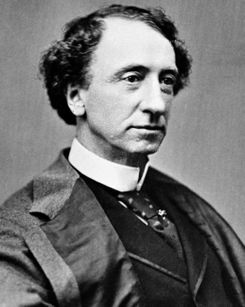 |
Sir John A. Macdonald (1815–1891) MP for Kingston, ON |
1 July 1867 |
5 November 1873 |
1867 (1st) • 1872 (2nd) | Liberal–Conservative | |
| Integration of Rupert's Land and the North-Western Territory into Canada; Manitoba Act; Red River Rebellion; Confederation of British Columbia; Creation of the North-West Mounted Police; Resigned over Pacific Scandal. | ||||||||
| 2 | 2 |  |
Alexander Mackenzie (1822–1892) MP for Lambton, ON |
7 November 1873 |
8 October 1878 |
— (2nd) • 1874 (3rd) | Liberal | |
| Pacific Scandal; Creation of the Supreme Court; Establishment of the Royal Military College; Created the office of the Auditor General. | ||||||||
| (1) | 3 |  |
Sir John A. Macdonald (1815–1891) MP for Victoria, BC 1878–1882 MP for Carleton, ON 1882–1887 MP for Kingston, ON 1887–1891 |
17 October 1878 |
6 June 1891 |
1878 (4th) • 1882 (5th) • 1887 (6th) • 1891 (7th) | Liberal–Conservative | |
| National Policy; North-West Rebellion; Hanging of Louis Riel. Died in office (stroke). | ||||||||
| 3 | 4 | 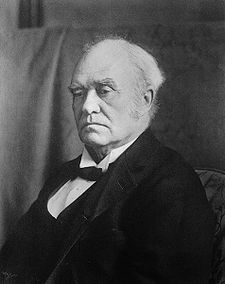 |
Sir John Abbott (1821–1893) Senator |
16 June 1891 |
24 November 1892 |
— (7th) | Liberal–Conservative | |
| Succeeded on Macdonald's death due to objections to the Catholic John Thompson. In ill health; retired. | ||||||||
| 4 | 5 | 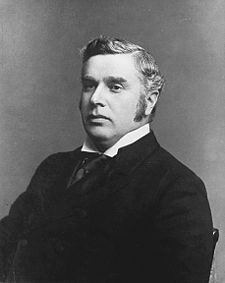 |
Sir John Thompson (1845–1894) MP for Antigonish, NS |
5 December 1892 |
12 December 1894 |
— (7th) | Liberal–Conservative | |
| First Catholic Prime Minister. Manitoba Schools Question. Died in office (heart attack). | ||||||||
| 5 | 6 | 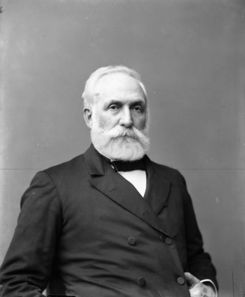 |
Sir Mackenzie Bowell (1823–1917) Senator |
21 December 1894 |
27 April 1896 |
— (7th) | Conservative | |
| Manitoba Schools Question. | ||||||||
| 6 | 7 |  |
Sir Charles Tupper (1821–1915) MP for Cape Breton, NS |
1 May 1896 |
8 July 1896 |
— (none) | Conservative | |
| Manitoba Schools Question. | ||||||||
| 7 | 8 | 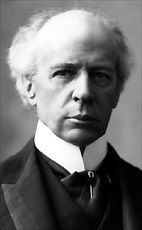 |
Sir Wilfrid Laurier (1841–1919) MP for Quebec East, QC |
11 July 1896 |
6 October 1911 |
1896 (8th) • 1900 (9th) • 1904 (10th) • 1908 (11th) | Liberal | |
| Manitoba Schools Question; Boer War; Confederation of Alberta and Saskatchewan; Creation of the Royal Canadian Navy; Reciprocity with the US. | ||||||||
| 8 | 9 • 10 |
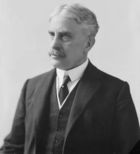 |
Sir Robert Borden (1854–1937) MP for Halifax, NS until 1917 MP for Kings, NS from 1917 |
10 October 1911 |
12 October 1917 |
1911 (12th) | Conservative | |
| 12 October 1917 |
10 July 1920 |
1917 (13th) | Unionist | |||||
| First World War; Military Service Act; Conscription Crisis of 1917; Unionist Party (Canada); Creation of the National Research Council; Introduction of income tax; Winnipeg General Strike; Nickle Resolution. | ||||||||
| 9 | 11 |  |
Arthur Meighen (1874–1960) MP for Portage la Prairie, MB |
10 July 1920 |
29 December 1921 |
— (13th) | N.L.C. | |
| — | ||||||||
| 10 | 12 | 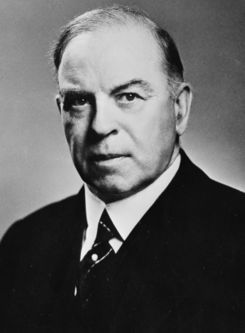 |
William Lyon Mackenzie King (1874–1950) MP for York North, ON until 1925 |
29 December 1921 |
29 June 1926 |
1921 (14th) • 1925 (15th) | Liberal | |
| Lost his seat in 1925 election, which resulted in a hung parliament; the Governor General refused his request to dissolve parliament (King–Byng Affair). | ||||||||
| (9) | 13 |  |
Arthur Meighen (1874–1960) MP for Portage la Prairie, MB |
29 June 1926 |
25 September 1926 |
— (15th) | Conservative | |
| Appointed as a result of the King–Byng Affair. Defeated and lost his seat in 1926 election. | ||||||||
| (10) | 14 |  |
William Lyon Mackenzie King (1874–1950) MP for Prince Albert, SK |
25 September 1926 |
6 August 1930 |
1926 (16th) | Liberal | |
| Introduction of old age pensions; Great Depression. | ||||||||
| 11 | 15 | 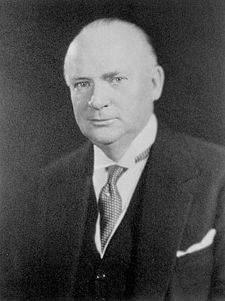 |
Richard Bedford Bennett (1870–1947) MP for Calgary West, AB |
7 August 1930 |
23 October 1935 |
1930 (17th) | Conservative | |
| Great Depression. | ||||||||
| (10) | 16 |  |
William Lyon Mackenzie King (1874–1950) MP for Prince Albert, SK until 1945 MP for Glengarry, ON from 1945 |
23 October 1935 |
15 November 1948 |
1935 (18th) • 1940 (19th) • 1945 (20th) | Liberal | |
| Creation of the Canadian Broadcasting Corporation; National Film Board of Canada; Nationalization of the Bank of Canada; World War 2; Trans-Canada Airlines. | ||||||||
| 12 | 17 | 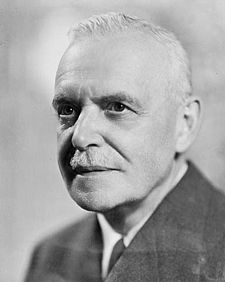 |
Louis St. Laurent (1882–1973) MP for Quebec East, QC |
15 November 1948 |
21 June 1957 |
— (20th) • 1949 (21st) • 1953 (22nd) | Liberal | |
| Canada's entrance into NATO and the UN; Suez Crisis; Creation of the United Nations Emergency Force; London Declaration; Newfoundland Act; Equalization; Trans-Canada Highway; St. Lawrence Seaway; Trans-Canada Pipeline; Pipeline Debate. | ||||||||
| 13 | 18 |  |
John Diefenbaker (1895–1979) MP for Prince Albert, SK |
21 June 1957 |
22 April 1963 |
1957 (23rd) • 1958 (24th) • 1962 (25th) | Progressive Conservative | |
| Avro Arrow cancellation; Coyne Affair; Cuban Missile Crisis; Canadian Bill of Rights. | ||||||||
| 14 | 19 |  |
Lester B. Pearson (1897–1972) MP for Algoma East, ON |
22 April 1963 |
20 April 1968 |
1963 (26th) • 1965 (27th) | Liberal | |
| Bomarc missile program; Introduction of Canadian universal healthcare; Canada Pension Plan; Canada Student Loans; Creation of a new Canadian flag; Auto Pact; Rejection of troop deployment to Vietnam; Royal Commission on Bilingualism and Biculturalism; Creation of the Canadian Forces; 1967 Canadian Centennial celebrations. | ||||||||
| 15 | 20 | 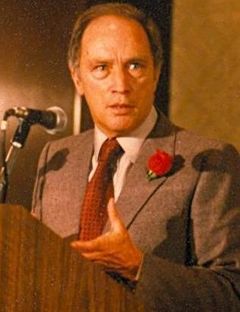 |
Pierre Trudeau (1919–2000) MP for Mount Royal, QC |
20 April 1968 |
4 June 1979 |
— (27th) • 1968 (28th) • 1972 (29th) • 1974 (30th) | Liberal | |
| "Trudeaumania"; "Just Society"; October Crisis; Use of the War Measures Act; Official Languages Act; Establishment of relations with China; Creation of Petro-Canada; Membership in the G7; Metric Commission. | ||||||||
| 16 | 21 | 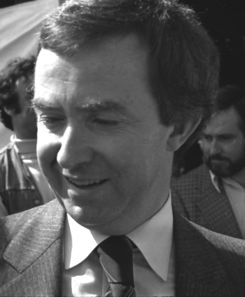 |
Joe Clark (1939– ) MP for Yellowhead, AB |
4 June 1979 |
3 March 1980 |
1979 (31st) | Progressive Conservative | |
| Youngest Canadian PM. Led a minority government; defeated in a motion of no confidence on tax proposals. | ||||||||
| (15) | 22 |  |
Pierre Trudeau (1919–2000) MP for Mount Royal, QC |
3 March 1980 |
30 June 1984 |
1980 (32nd) | Liberal | |
| Introduction of the NEP; 1980 Referendum; Access to Information Act; Repatriation of the Canadian Constitution; Canadian Charter of Rights and Freedoms; Western alienation. | ||||||||
| 17 | 23 | 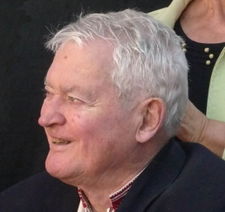 |
John Turner (1929– ) |
30 June 1984 |
17 September 1984 |
— (32nd) | Liberal | |
| Trudeau Patronage Appointments | ||||||||
| 18 | 24 | 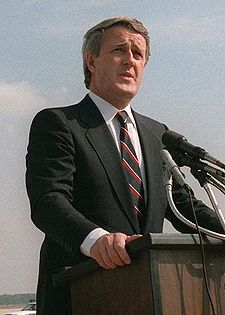 |
Brian Mulroney (1939– ) MP for Manicouagan, QC until 1988 MP for Charlevoix, QC from 1988 |
17 September 1984 |
25 June 1993 |
1984 (33rd) • 1988 (34th) | Progressive Conservative | |
| Cancellation of the NEP; Meech Lake Accord; Air India bombing; Canada-US Free Trade Agreement; Introduction of the GST; Charlottetown Accord; Good relations with Ronald Reagan; Petro-Canada privatization; Gulf War; École Polytechnique massacre; Oka Crisis; Environmental Protection Act; NAFTA; Airbus affair. | ||||||||
| 19 | 25 | 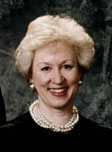 |
Kim Campbell (1947– ) MP for Vancouver Centre, BC |
25 June 1993 |
4 November 1993 |
— (34th) | Progressive Conservative | |
| First female Prime Minister of Canada. Defeated and lost her seat in 1993 election. | ||||||||
| 20 | 26 | 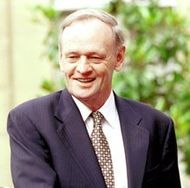 |
Jean Chrétien (1934– ) MP for Saint-Maurice, QC |
4 November 1993 |
12 December 2003 |
1993 (35th) • 1997 (36th) • 2000 (37th) | Liberal | |
| Red Book; HST; 1995 Referendum; Clarity Act; Assassination attempt; Kosovo War; 1997 Red River Flood; Social Union Framework Agreement; Creation of Nunavut Territory; Youth Criminal Justice Act; Shawinigan Handshake; Invasion of Afghanistan; Opposition to the Invasion of Iraq; Sponsorship scandal; Kyoto Protocol; Gomery Inquiry. | ||||||||
| 21 | 27 | 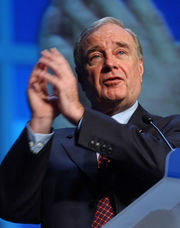 |
Paul Martin (1938– ) MP for LaSalle—Émard, QC |
12 December 2003 |
6 February 2006 |
— (37th) • 2004 (38th) | Liberal | |
| Sponsorship scandal; Gomery inquiry; Civil Marriage Act; Kelowna Accord; Rejection of US Anti-Missile Treaty; G20; Atlantic Accord. | ||||||||
| 22 | 28 |  |
Stephen Harper (1959– ) MP for Calgary Southwest, AB |
6 February 2006 |
Incumbent | 2006 (39th) • 2008 (40th) | Conservative | |
| Federal Accountability Act; GST Reduction; Afghan Mission Extension; Chuck Cadman Affair; Québécois nation motion; Apology for Chinese Head Tax; Israel-Lebanon Conflict; Veterans' Bill of Rights; Residential Schools Apology; Financial crisis of 2007-2010; 2008–2009 Canadian parliamentary dispute; 2009 Budget; Abousfian Abdelrazik; 2009 flu pandemic; Canadian Afghan detainee issue. | ||||||||
Living former Prime Ministers
As of March 2010[update], there are six living former Prime Ministers of Canada, the oldest being John Turner (1984, born 1929).. The most recent Prime Minister to die was Pierre Trudeau (1968–1979, 1980–1984), on September 28, 2000.
| Name | Term of office | Date of birth |
|---|---|---|
| Joe Clark | 1979–1980 | June 5, 1939 |
| John Turner | 1984 | June 7, 1929 |
| Brian Mulroney | 1984–1993 | March 20, 1939 |
| Kim Campbell | 1993 | March 10, 1947 |
| Jean Chrétien | 1993–2003 | January 11, 1934 |
| Paul Martin | 2003–2006 | August 28, 1938 |
See also
- History of Canada
- List of Prime Ministers of Canada by time in office
- List of Joint Premiers of the Province of Canada
- List of Canadian Leaders of the Opposition
- List of Canadian federal parliaments
References
- "Prime Ministers of Canada - 1867 to Date" (.asp). Parliament of Canada. http://www.parl.gc.ca/information/about/people/key/pm/index.asp?Language=E¶m=mp. Retrieved August 26, 2006.
- "Prime Ministers of Canada" (.htm). Canada Info Link. http://www.canadainfolink.ca/pms.htm. Retrieved August 26, 2006.
External links
Related information
|
|||||||||||||||||||||||||||||||||||||||||||||||||||||||||||||||||||||||||||||||||||||||||||||||||